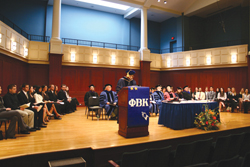On Campus
EOF Program retention rates skyrocket
A recent study focusing on the retention rate of TCNJ students who entered the Educational Opportunity Fund (EOF) Program in 2004 showed that a new funding initiative has produced exceptional results. While the EOF Program has enjoyed considerable success since it was adopted by the College in 1968, the EOF Promise Award initiated by President R. Barbara Gitenstein three years ago has caused a spike in the rate of retention of EOF students.

Stacy Holland ′92, currently chair of TCNJ's Board of Trustees, is an EOF success story.
The EOF Program provides access for students who come from economically distressed environments or lack access to quality educational preparation for college. The EOF Promise Award is an added incentive designed to meet the full cost of attendance at TCNJ for these students’ freshman and sophomore years. The first year of the program is paid for by the College through grants and scholarships. The second year is also funded, but there is a work component to make certain the student develops a sense of ownership. (Prior to 2004, college expenses were only paid through the first year.)
For the 2004 cohort, the retention rate from the first year to the second year was 96.7 percent, and the rate entering the third academic year was 79.3 percent. That nearly doubled the average retention rate for EOF students prior to the Promise Award. In addition, institutional data confirms that EOF graduates from TCNJ are experiencing high success rates in their chosen fields. “What makes those numbers even more astounding is that TCNJ has transformed its curriculum, making it more difficult to earn a degree,” noted James Boatwright, director of the Office of Academic Support Programs. “The standards are higher than ever, and the academic work is tougher. The core of the program is to instill an attitude of high expectations in the students. We expect the EOF students to do well, and we make them fully aware of those expectations.”
New Jersey high school students who are accepted to TCNJ as part of the EOF Program are required to attend a fiveweek summer program described as intensive academic training. The emphasis of the program is on reading, writing, and math skills. Professors and tutors live in residence halls with the students to provide greater access and prepare the incoming freshmen for their first semester of classes. Acceptance to EOF hinges on adequate performance and completion of the summer program. Once the fall semester begins, students must fulfill specified requirements throughout the academic year, including six to nine extra study hours per week and a weekly meeting with program specialists.
According to Boatwright, there is an underlying theme that is often preached to the EOF students. The fact that they come from a disadvantaged situation can either be used as an excuse or a source of resolve. “It’s only a disadvantage if you believe it’s a disadvantage,” explained Boatwright. “It’s a state of mind. Instead of people always telling these kids ‘they can’t,’ we like to tell them, ‘Yes, you can.’”
Mark Gola
New service learning model
The First-Year Experience Program at The College of New Jersey recently restructured its model to enhance the community engagement requirement for freshmen students. The Bonner Center for Civic and Community Engagement has taken a leading role in this effort, creating a more eclectic and inspirational experience in an effort to impassion students to continue their volunteer efforts beyond their curriculum requirement. Each incoming freshman must participate in specific learning seminar classes or in one of the many issue-based Community Engaged Learning days that are scheduled throughout the year.
“We’re trying to create a day for freshmen students when they will be involved in a meaningful service and participate in projects that benefit the community,” said Pat Donohue, the Bonner Center’s director of communityengaged learning. “By educating and inspiring the students, we hope to sustain their interest in communityrelated issues. We’ve collected data through surveys, and approximately 50 percent of the 2006–07 freshmen students would like to continue their involvement, which is outstanding.”
During the fall semester, freshmen students are given a list of over 25 community issues. They are asked to rank their top three preferences, and the Bonner Center attempts to match students with a topic of interest. Small communities of students are formed by their residential floor, and the group is given a date on which its specific event (and service) will take place. The spectrum of issues for service includes the environment, homelessness, immigration, youth development, diversity, and senior services, among others. TCNJ partners with organizations such as Habitat for Humanity, Clean Ocean Action, Young Scholars Institute, and the Special Olympics of New Jersey to foster both productive efforts and opportunities to build relationships between the organizations, the College’s Bonner Scholars (students in a special leadership and civic engagement program at TCNJ), and freshmen students. Each day’s event is divided into four phases: learning, serving, reflecting, and sustained involvement.
The day begins with the learning stage, when students receive a pre-service educational packet and observe a presentation. Speakers range from community organization leaders, to professors, to local residents directly impacted by the issue. The serving phase follows and is coordinated by the community organization and a Bonner Scholar. An example of the serving phase from this past November saw students spend the day cleaning the beach at Sandy Hook and planting dune grass. After the hands-on service is performed, students spend 30–45 minutes reflecting on their experience. Donohue affirms that the learning has a greater impact when students hear their own voices and verbalize their thoughts and observations. Finally, students are given an opportunity to volunteer on a regular basis and learn how they might integrate the needs or interests of the community into their own course of study.
“When the freshmen students are educated and take an active role in contributing during these service events, they really develop a personal interest,” stated Donahue. “I think this new structure will continue to grow and provide an even greater service to the community.”
Mark Gola
Phi Beta Kappa chapter installed at TCNJ; first class of students inducted

Fewer than 10 percent of colleges and Universities nationally have been awarded Phi Beta Kappa chapters, and TCNJ is now among them.
Two hundred years ago, Phi Beta Kappa (PBK) induction ceremonies were covert affairs complete with secret handshakes and rituals. Things were decidedly less secretive on April 9, when the Delta of New Jersey chapter of PBK was installed at the College and the first class of TCNJ students was inducted into the society.
Allison Blakely, president of PBK national, delivered the opening remarks at the April 9 event, calling TCNJ “an institution of remarkable excellence in the liberal arts and sciences…[and one that] embraces and upholds the highest standards of excellence in teaching and learning. ”
Following the traditional installment procedures drawn from PBK documents dating to 1776, the Delta of New Jersey chapter, as it will be known, was awarded its charter by John Churchill, secretary of PBK national. As part of
the proceedings, President R. Barbara Gitenstein was inducted as a foundation member.
Once the charter was received, 44 of TCNJ’s best and brightest students were inducted into the chapter. As is tradition, inductees signed their name into a special book, thus signifying them as official members. The chapter ’s officers—TCNJ faculty and staff who are PBK members from their own undergraduate days—then taught each inductee the “secret” handshake, which is used when PBK members greet each other.
“Phi Beta Kappa is the oldest and most prestigious honors society in the country,” said Nancy Freudenthal, assistant provost. “Membership in it is something these students will carry with them well past graduation and throughout their lives.”
The College was awarded a chapter last fall, becoming one of only 276 colleges and universities nationwide to house a chapter. Freudenthal, along with Professor of English David Venturo, were lead authors of the College ’s application.
Joe Garavente ’08


